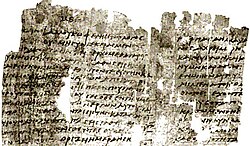| Hebrews 7 | |
|---|---|
 Epistle to the Hebrews 2:14-5:5; 10:8-22; 10:29-11:13; 11:28-12:17 in Papyrus 13 (AD 225-250) | |
| Book | Epistle to the Hebrews |
| Category | General epistles |
| Christian Bible part | New Testament |
| Order in the Christian part | 19 |
Hebrews 7 is the seventh chapter of the Epistle to the Hebrews in the New Testament of the Christian Bible. The author is anonymous, although the internal reference to "our brother Timothy" (Hebrews 13:23) causes a traditional attribution to Paul, but this attribution has been disputed since the second century and there is no decisive evidence for the authorship. [1] [2] This chapter contains an exposition about the superiority of Christ's priesthood using material from Melchizedek to the Levitical Priesthood. [3] [4]
Contents
- Text
- Textual witnesses
- Old Testament references
- Melchizedek the Priest-King (verses 1–3)
- Verse 1
- Verse 2
- Verse 3
- The greatness of Melchizedek (verses 4–10)
- Verse 4
- Verse 9
- Imperfection of the Aaronic Priesthood (verses 11–14)
- Verse 14
- Superior Because of the Divine Oath (verses 20–22)
- Verse 22
- Superior Because of Its Permanence (verses23–25)
- Verse 24
- Verse 25
- Superior Because of the Character of Jesus (verses 26–28)
- Verses 26–27
- Verse 28
- See also
- Notes
- References
- Sources
- External links